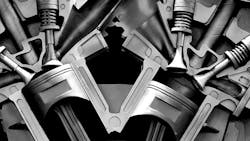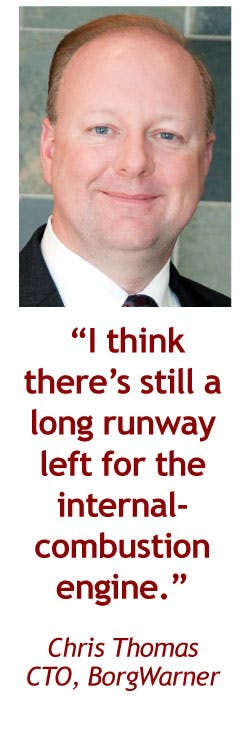The internal-combustion engine has come a long way in recent years. But the Obama administration's looming CAFE standards -- which require automakers to nearly double fuel economy to 54.5 mpg by 2025 -- are forcing the auto industry to keep its foot on the gas.
The push for better fuel economy and lower emissions has been a boon to BorgWarner Inc. The company, which raised its full-year financial guidance after posting record net earnings and operating margin in the second quarter, makes turbochargers, exhaust-gas recirculation systems and other technologies that are key enablers of the engine's evolution.
Those improvements will come not only from refinements in existing technology but also from the development of new technology, such as BorgWarner's pressure-sensor glow plug for diesel engines. The component measures in-cylinder pressure in the combustion chamber and continuously reports it to the engine control unit, enabling the engine controller to constantly regulate fuel-injection quantity and timing.
Still, there's no magic bullet -- at least not yet. Advanced combustion technologies such as homogenous-charge compression ignition have shown a lot of promise, but they still require further research before they become viable solutions. Taking internal-combustion efficiency to the next level, Thomas asserts, will require a "systems approach."
"These technologies are very synergistic, very complementary," Thomas says. "They actually enable each other to gain more fuel economy than any one of them could by themselves."
With the auto industry under the gun, automakers, suppliers and other stakeholders are looking beyond the engine itself for further gains in efficiency, explains Jason Kavanagh, engineering editor for Edmunds.com. That includes using carbon fiber and other composite materials to make vehicles lighter.
"Low-rolling-resistance tires, better lubricants that reduce friction -- basically anywhere there are gains to be made, there will be gains made," Kavanagh says.
About the Author
Josh Cable
Former Senior Editor
Former Senior Editor Josh Cable covered innovation issues -- including trends and best practices in R&D, process improvement and product development. He also reported on the best practices of the most successful companies and executives in the world of transportation manufacturing, which encompasses the aerospace, automotive, rail and shipbuilding sectors.
Josh also led the IndustryWeek Manufacturing Hall of Fame, IW’s annual tribute to the most influential executives and thought leaders in U.S. manufacturing history.
Before joining IndustryWeek, Josh was the editor-in-chief of Penton Media’s Government Product News and Government Procurement. He also was an award-winning beat reporter for several small newspapers in Northeast Ohio.
Josh received his BFA in creative writing from Bowling Green University, and continued his professional development through course-work at Ohio University and Cuyahoga Community College.
A lifelong resident of the Buckeye State, Josh currently lives in the Tremont neighborhood of Cleveland. When the weather cooperates, you’ll find him riding his bike to work, exercising his green thumb in the backyard or playing ultimate Frisbee.

